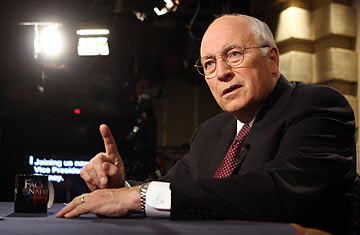
Former Vice President Dick Cheney on CBS's Face the Nation on May 10
For a man whose public profile was almost nonexistent while he was a public servant, it's clear from his schedule alone that private citizen Cheney hasn't merely resurfaced — he's gone on the offensive. The question is, Why?
Parsing Cheney — code-named Angler by the Secret Service — is a lot like fishing in dark water; there's a lot going on underneath, but you'd never know it from staring at the surface. So let's take Cheney's own stated explanation first. The former Veep says he's worried that by dismantling a controversial Bush-era terrorist surveillance program and stepping back from harsh interrogation policies, the Obama Administration is putting the nation at risk. "I think it's fair to argue," said Cheney, "that we're not going to have the same safeguards we've had for the last eight years." (See pictures of former President George W. Bush's trip to the Middle East.)
Cheney is clearly troubled both by Obama's rollback of the policies he championed and the buzz on the left that a sitting President might prosecute a predecessor who took those policies too far. Cheney has repeatedly charged the White House with proceeding with prosecutions against the Justice Department lawyers who found the legal basis for the policies and the CIA officers who executed them. But Cheney is reaching: Obama has stopped short of calling for anything more than a probe into the genesis of the Bush-era tactics. True, a probe might well lead to more questions about Cheney's conduct, but Obama has specifically ruled out legal action against the CIA officers. (Read "Did Waterboarding Prevent Terrorist Attacks?")
A more likely explanation is that Cheney, who championed the idea of preemptive-attack doctrine as Vice President, knows that in politics as well the best defense is often a good offense. With the White House decision to release various Bush-era memos on interrogation, and the coming disclosure of thousands more photographs from Abu Ghraib later this month, Cheney is "trying to rewrite history," says a Republican consultant who has experience in intelligence matters. "He knows that as time goes by, he will look worse. And so he's trying to put his stroke on it." (See pictures of the aftershocks of Abu Ghraib.)
Cheney obliquely conceded as much on Sunday, when he told CBS's Bob Scheiffer, "I think it's very, very important that we have a clear understanding that what happened here was an honorable approach to defending the nation, that there was nothing devious or deceitful or dishonest or illegal about what was done." That sounds like: O.K., we got a little out of hand. But we meant well. So how 'bout we just let it go?
What's quite clear about Cheney's sudden chatty spree is that he wants to refocus the question about waterboarding and other interrogation techniques from whether they were legal to whether they worked. After eight years on the front lines of the war on terrorism, perhaps that is all a man can see. It certainly might explain why Cheney is making such a fuss about asking Obama to release a pair of after-action memos — which he says offer proof that the controversial methods produced evidence that, as Cheney claimed on Sunday, "saved thousands, perhaps hundreds of thousands of lives."
A far darker explanation for the spring offensive isn't about the past but the future. Obama officials have spied something like a set-up in Cheney's latest gambit. One of the Bush team's biggest talking points in its final days in office was an insistence that its greatest accomplishment was preventing a second attack in the years after Sept. 11. By laying down the charge now that Obama has made the country less safe, the Bush team may be able to point fingers of blame if a second attack ever comes.
Cheney has never had great political instincts, but it's possible that with the Republican Party scattered and adrift, he sees little to lose and perhaps something to gain from stating his case now. Cheney briefly ran for President in 1996, and though he is unlikely to make that mistake again, he may see a chance to boost his dismal approval ratings at least within the battered ranks of the GOP. The argument against this is that it's difficult to believe that even the former Vice President thinks a personal campaign for waterboarding is a good political move.
In any case, Cheney's reappearance has delighted Democrats — "Bring it on!" quipped a White House official on Tuesday afternoon, when asked about Cheney's re-emergence — and dismayed Republicans. Said one: "We're trying to turn the page, and he's climbing out of the grave to haunt us."
